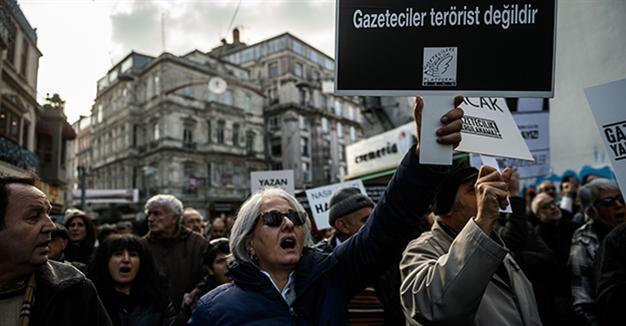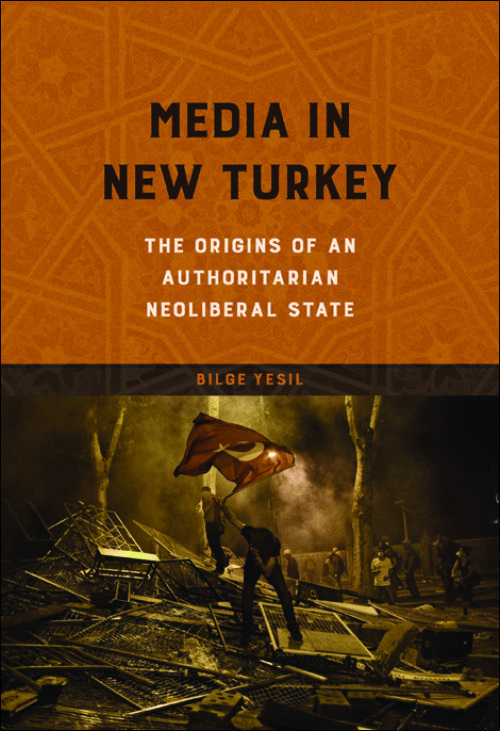Protesters stage a ‘30-step march’ in Istanbul in December 2015 to protest the arrest of Cumhuriyet journalists Can Dündar and Erdem Gül over a story on state-owned trucks purportedly carrying arms to militants in Syria. AFP photo
The title of this book by Bilge Yeşil is rather ironic. “New Turkey” is a phrase used by the Turkish government to refer to the bright new era of economic advancement and democratic freedoms across the country. Skeptics paint a less flattering image, saying “New Turkey” marks an era of tightening anti-democratic measures and narrowing freedoms. There may be little “new” about them, but authoritarian dynamics can certainly be seen in present-day Turkey’s media landscape.

You cannot understand the forces at work in Turkey today without understanding what happened in the 1980s. After the 1980 military coup, the country’s economy was opened up. But that did not necessarily mean a retreat of the state. In fact, the Turkish state’s coercive powers were greatly strengthened
in the 1980s. Its role simply shifted from being a protector of Turkish society and economy from global market forces to a facilitator of their integration into the world economy.
The media was deeply affected. Yeşil writes that it was during the 1980s that a “hybrid system [blending] commercial and statist imperatives … began to exist in a symbiotic relationship.” Patronage structures overlapped with market impulses. As the state awarded lucrative contracts and privatization gathered steam, businessmen looking for a slice of the action bought media outlets to curry favor in Ankara. With the dismantling of the state monopoly in broadcasting and the privatization of communication assets, they had plenty of opportunity. Despite this diversification of media ownership, all reporters, journalists and publishers were expected to prioritize state interests above all else and not to cross the lines drawn by power holders. In this context it is hardly surprising that Turkey’s mainstream media has rarely served as a plucky Fourth Estate holding power to account.
That dynamic has continued to this day. “Mainstream media’s alignment with official state ideology,” Yeşil writes, has been “premised on patron-client relationships between media moguls and power brokers.” Commercial outlets are “simultaneously independent of the state and dependent on it. They are not formally owned, operated, or dominated by the state, yet their survival depends on their informal ties with the ruling elite, high bureaucracy, and judiciary.” Ownership of media is seen by Turkish tycoons as a kind of tax that must be paid in order to flourish in other sectors, particularly the energy, urban development and healthcare sectors. “Entrepreneurs knew very well that their acquisitions would not turn an immediate profit, but rather would help them strengthen [their] position in political networks … and consolidate good relations with the government.”
In the 1990s, media owners were complicit in supporting a military-dominated regime. Mockery of elected politicians could be
merciless, but anything approaching criticism of the military-industrial regime was off-bounds. All editors from the time admit to having a direct hotline to generals, who often essentially ordered them what to write. Dinç Bilgin, founder of the Sabah and Takvim newspapers and ATV, is quoted by Yeşil as saying that “back then every newspaper had relations with the military. It was because of the bids and contracts distributed by the state.” Another journalist says “it was a known fact that the military and state bureaucracy were aligned with each other. They were on the same team, so to speak … Media owners were always in search of a ‘contact’ person in the military or in the high courts, so they could get the heads up, for example, about an upcoming energy distribution deal.” Such intimate business relationships between media tycoons and the state badly damaged the quality of the Turkish media.
Today, the model is the same but the actors have changed. Over its 14 years in office, the ruling Justice and Development Party (AKP) has resorted to all levers of the state to cultivate a tame mainstream media landscape. It strategically uses economic sticks and carrots to create new patron-client relationships “via control of state-owned banks, privatization deals and tax subsidies … channeling state advertising to sympathetic outlets.” Media owners seen as insufficiently subservient have been handed tax fines, while those giving sympathetic coverage have been rewarded with lucrative contracts in other sectors. Next time you see news about one of Turkey’s many infrastructure “megaprojects,” take a look at the firms that have been given the contract. Chances are they will be linked to one of the big holding companies that dominate the AKP-friendly mainstream media.
Yeşil writes that the current troubles in Turkey’s media system are not unusual developments that can simply be imputed to AKP rule. What the AKP has done since coming to power in 2002 is “less about democratization and more about the reconsolidation of Turkey’s enduring authoritarian political culture, only this time mixed with the party’s particular brand of Islamism, nationalism, and neoliberalism.”
The book is not without flaws. In particular, some sections lack important detail. The point about media owners operating in other sectors is key, but there is little analysis of how that actually works in practice, few examples of how project tenders work. I also felt the book slightly neglected the role of Turkey’s always sensational media in stoking the country’s bitter culture war - surely an important angle to consider.
But on the whole it is a very well-researched book. Everyone interested in contemporary Turkey’s grim media landscape should read it.
*Follow the Turkey Book Talk podcast via iTunes here, Stitcher here, Podbean here, or Facebook here.
 You cannot understand the forces at work in Turkey today without understanding what happened in the 1980s. After the 1980 military coup, the country’s economy was opened up. But that did not necessarily mean a retreat of the state. In fact, the Turkish state’s coercive powers were greatly strengthened in the 1980s. Its role simply shifted from being a protector of Turkish society and economy from global market forces to a facilitator of their integration into the world economy.
You cannot understand the forces at work in Turkey today without understanding what happened in the 1980s. After the 1980 military coup, the country’s economy was opened up. But that did not necessarily mean a retreat of the state. In fact, the Turkish state’s coercive powers were greatly strengthened in the 1980s. Its role simply shifted from being a protector of Turkish society and economy from global market forces to a facilitator of their integration into the world economy.